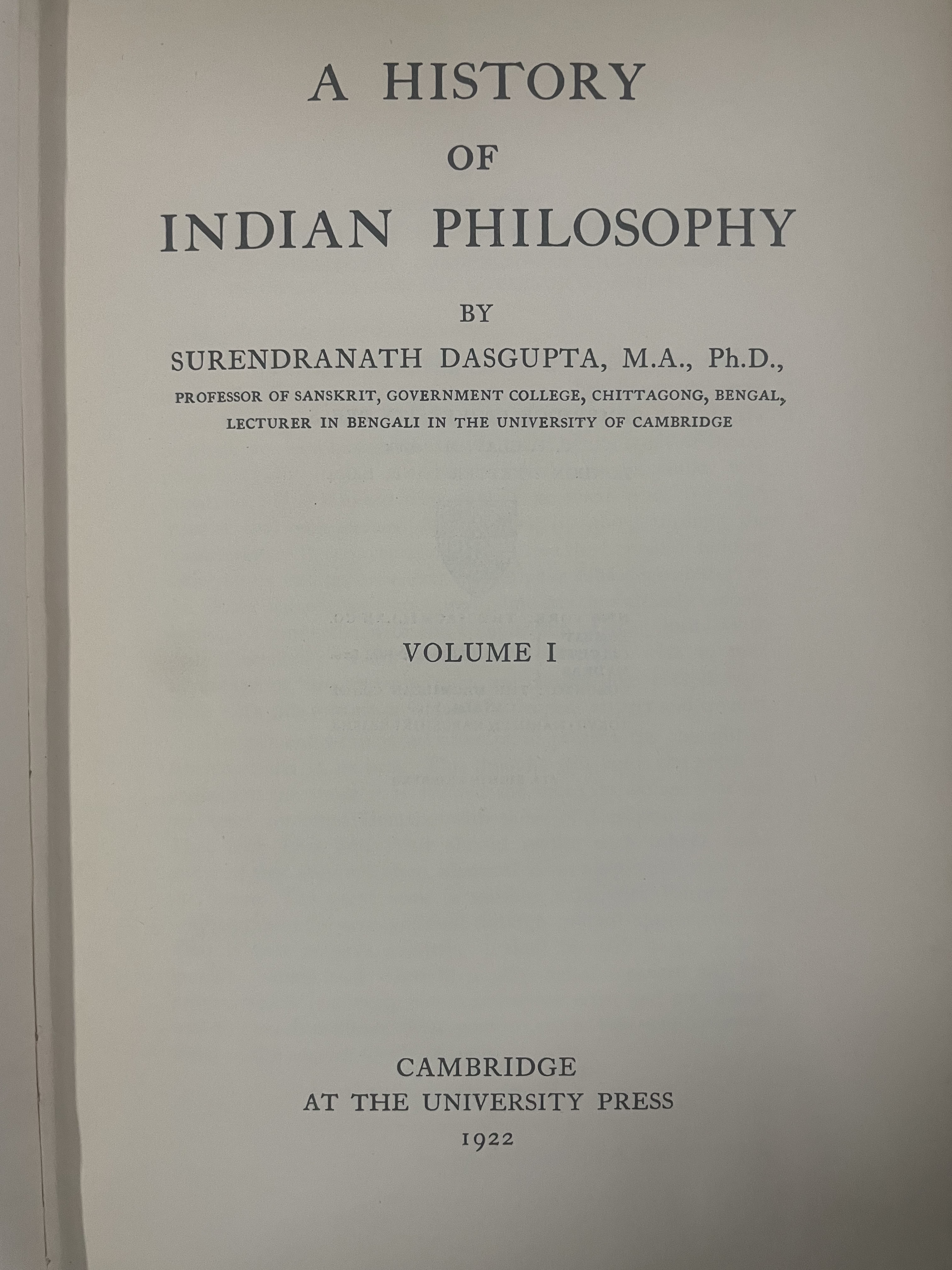The History of Indian Philosophy Vol 1

About
Summary
Exquisite
TOC
Details
Related
URL
Images
Overview
Surendranath Dasgupta's A History of Indian Philosophy, Volume 1, originally published in 1922, is a comprehensive exploration of the formative stages and principal schools of thought within Indian philosophy. This volume is the first in a series of five, in which Dasgupta examines the diverse philosophical traditions that have shaped Indian culture.A History of Indian Philosophy, Volume 1 examines the Vedas, the Brahmanas, the early Upanishads, as well as six systems of Hindu thought: Samkhya, Yoga, Nyaya, Vaisesika, Mimamsa, and Vedanta. The book provides an in-depth understanding of Indian philosophical traditions, highlighting common doctrines such as karma, mukti, and the concept of the inner self (ātma).
Key Themes
The Vedas and Brahmanas: The book delves into the philosophical content of the Vedas, the oldest scriptures of Hinduism, and the Brahmanas, which are commentaries on the Vedas. It examines how these texts lay the groundwork for subsequent philosophical developments in India.
The Upanishads: Dasgupta explores the emergence of the concept of the unity of the individual self (atman) and the all-encompassing Brahman, understood as the totality of universal reality. The Upanishads marked a shift from ritualistic practices to philosophical speculation, with concepts like rebirth and karma first elaborated in these texts.
Six Systems of Hindu Thought: The volume provides detailed analyses of the Samkhya, Yoga, Nyaya, Vaisesika, Mimamsa, and Vedanta systems.
Truth and Reality: The concept of truth as ultimate reality (Satya) is a recurring theme. Gandhi saw "Truth is God," representing the essence of reality and existence.
Cultural Significance
Comprehensive Study: The book offers a thorough examination of the principal schools of thought that define Indian philosophy. Dasgupta highlights philosophy as the most important achievement of Indian thought, essential for understanding India's complex culture.
Spiritual and Philosophical Integration: In ancient India, philosophy, religion, and medicine were interconnected, capturing the Indian worldview. Indian philosophy is a reflective, reasoned account of spiritual intuitions regarding ultimate reality.
Influence on Indian Culture: Dasgupta argues that understanding the history of Indian philosophy is necessary to appreciate the significance and potentialities of India's complex culture. The themes of karma, liberation, and the soul are significant in Indian philosophical traditions, reflecting the close relationship between philosophy and spirituality in the Indian context.
Unity in Diversity: India’s central conception involves the spirit encased in matter, evolving through rebirth until it enters the realm of conscious morality. India’s social system, philosophy, religion, art, and literature are founded upon this conception, emphasizing spiritual progress.
Effects on Society
Reform and Uniqueness: Gandhi's integration of Truth, Brahmacharya (purity), non-violence, and non-possession reflects the influence of Jainism and Buddhism, while also reforming Indian philosophical tradition to be more accessible to the common person.
Coordination of Philosophy and Religion: Gandhi's perspective makes a coordination between philosophy and religion, finding a strong relationship between reality and its beyond.
Foundation of Indian Thought: Dasgupta's work highlights how ancient Indian philosophy influenced spiritual life and the Hindu way of living in India.
Accessibility of Ancient Wisdom: By examining the Vedas, Upanishads, and various philosophical systems, the book makes ancient wisdom accessible to contemporary readers, fostering a deeper understanding of Indian intellectual and spiritual heritage.
Promotion of Critical Thinking: Dasgupta’s detailed analysis of logic, epistemology, and metaphysics encourages critical thinking and intellectual inquiry, influencing philosophical discourse and education in India.
Contribution to Global Philosophy: A History of Indian Philosophy has introduced Indian philosophical concepts to a global audience, promoting cross-cultural dialogue and enriching the field of philosophy worldwide.
Conclusion
A History of Indian Philosophy, Volume 1 is a detailed exploration of the rich heritage of Indian philosophical thought, providing insights into its cultural significance and lasting impact on Indian society
Title
The History of Indian Philosophy Vol 1
Author
Surenderanath Dasgupta
Name of Publisher
Cambridge The University Press
Publish Date
1922
Subject
Indian philosophy
Vintage
1901-1947
Number of Pages
528
Category
Philosophy
Sub Category
India
Rarity
RARE
